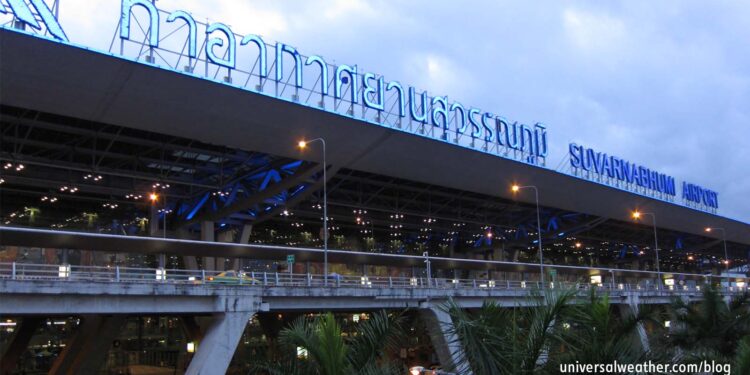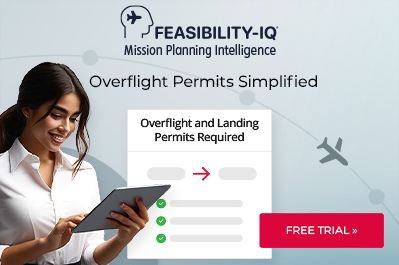Bangkok – Which Airport to Pick: Part 1- Landing Options

This business aviation blog post is part of a series on traveling to Bangkok.
Two airports of entry (AOEs) are available to general aviation (GA) in the Bangkok area. Each has particular pros and cons. Both airports are unrestricted, in terms of aircraft size and noise levels, and do not have curfew hours in place.
The following is an overview of what you need to know:
1. Don Muang airport
Don Muang (VTBD) is the old Bangkok airport, and it’s located about 18.5 miles north of downtown at about a 30 minute drive. This airport requires airport slots – with deviation of -/+ 10 minutes –, and slots must be confirmed prior to requesting a landing permit. Aircraft parking availability is not an issue at VTBD, and you can generally park as long as you like. Hangar space, for transient aircraft, may be arranged at VTBD, with prior arrangement, via your ground handler.
2. Suvarnabhumi airport
Suvarnabhumi (VTBS) is the new airport (in operation since 2006), and it’s located 15.5 miles east of central Bangkok – about a 30 minute drive from downtown. This is the airport where most scheduled international commercial traffic to Bangkok is handled. It’s a congested airfield, and GA aircraft may only stay on the ground for a maximum of three hours at this location. If an aircraft needs to overnight in Bangkok, it will have to be repositioned to VTBD. Prior permission required (PPR) is necessary for this location with seven days’ notice. Note that airport slots are also needed for VTBS – with deviation -/+ 10 minutes –, and slots must be confirmed prior to requesting a landing permit.
3. Bangkok airport considerations
VTBS has peak hours of commercial activity 0500-1500 UTC, while VTBD does not really have any peak hour periods. As VTBS does not offer overnight GA parking you’re better off using VTBD if overnight parking is a requirement. Runways, taxiways, and ramp areas are in good condition at both airports, and there are currently no closures scheduled for runway work. Aircraft may be relocated on the ramp at either airport with notice usually given to crew at least 24 hours prior to aircraft being relocated.
4. In-flight catering options
In-flight caterers are available on the field at both Bangkok airports. It’s best to provide 48 hours advance notice for catering requests. At minimum, at least 24 hours prior notification is recommended.
5. Hotels and local transport
There are plenty of good crew hotel options available in the Bangkok area – both in the city center and closer to the airports. These include a variety of major international chain hotels. Rental car facilities are available at both airports – at the private jet terminal at VTBD and within the main terminal at VTBS. It’s not, however, recommended to rent vehicles unless you’re quite familiar with the area as there’s a great deal of road congestion to consider. Public taxis should generally be avoided due to security concerns and language barriers. The recommended option, for travel within the Bangkok area, is prepaid transport (car with driver) vetted by either your ground handler or security provider.
6. Security considerations
While both Bangkok airports are secure – in terms of adequate fencing, patrols and video surveillance – additional aircraft security may be arranged at either location with prior arrangement. It’s recommended to obtain a security brief prior to operating to Bangkok. You may also want to consider secure transportation for passengers/crew for travel locally within the Bangkok area – particularly when traveling at night. There are geopolitical issues to consider, particularly these days, when traveling to Thailand. So, it’s best to try to ascertain any pending issues taking place in Bangkok, prior to arrival, and to plan on additional surface travel time as needed. Your ground handler will be able to give you the latest local updates.
7. Additional tips
It’s possible, at both Bangkok airports, to have private vehicles drop passengers off planeside — assuming the particular transportation company has an appropriate license issued by the airport. If you’d like to take advantage of this service it’s important to confirm arrangements well in advance. For fuel uplifts a fuel release is always recommended. It’s best practice to request fueling services 48 hours in advance.
Conclusion
Your 3rd-party provider, and/or local ground handler, will confirm applicable restrictions/considerations for each airfield. A full range of aircraft support and 4th-party services are available at both airports.
Questions?
If you have any questions about this article or would like assistance planning your next trip to Bangkok, contact me at angeladavis@univ-wea.com.
Stay tuned for Part 2, which covers CIQ and security for operations to Bangkok.




